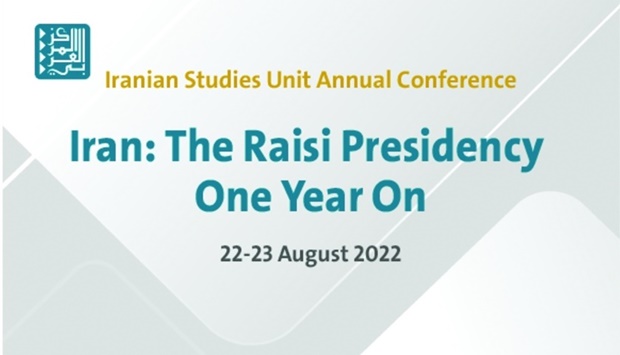The Iranian Studies Unit of the Arab Center for Research and Policy Studies will hold its second annual conference from August 22-23 on 'Iran: The Raisi Presidency One Year On.'
The conference, featuring a selection of scholars of Iran, will analyse the first year of Raisi’s presidency by examining the continuities and changes in politics and policies. The topics to be covered are:
- Iranian foreign policy, especially Iran’s relations with the great powers; Iran and the states of the Gulf Cooperation Council (GCC); Iran and non-state actors; nuclear negotiations and the JCPOA; and Iran in the Caucasus;
- Domestic politics, including the role of the various political institutions; the legitimacy of the system; treatment of activists; media freedoms, the future of the Velayat-e Faqih; the religious establishment; labour issues and activism; protests; cyber activism and restrictions;
- The Iranian economy, with a focus on the impact of sanctions and the Iranian economy; cryptocurrency; workforce and employment; income inequality; industrial manufacturing and production; agricultural production;
- Public policy, including the state’s approach to the Covid-19 pandemic and healthcare, demographic shifts and developments, refugees, climate change and environmental challenges, and cyberspace.
The conference will address these topics in 15 papers distributed among seven panels, in addition to a public lecture titled 'Iranian Foreign Policy and the Raisi Presidency,' delivered by Seyed Hossein Mousavian, former spokesman for Iran in its nuclear negotiations with the international community and a Middle East Security and Nuclear Policy Specialist at Princeton University’s School of Public and International Affairs.
Conference participants include a number of prominent scholars, including Hamid Ahmadi, Leen al-Rabbat, Hassan Muzaffar al-Razzo, Gawdat Bahgat, Esfandyar Batmanghelidj, Abdolrasool Divsallar, Javad Heiran-Nia, Bernard Hourcade, Nikolay Kozhanov, Eric Lob, Amir Mahdavi, Rovshan Mammadli, Ilkhom Mirzoev, Mahmood Monshipouri, Mahmoud Muhareb, Anas Omair, and Mahjoob Zweiri.
The conference, featuring a selection of scholars of Iran, will analyse the first year of Raisi’s presidency by examining the continuities and changes in politics and policies. The topics to be covered are:
- Iranian foreign policy, especially Iran’s relations with the great powers; Iran and the states of the Gulf Cooperation Council (GCC); Iran and non-state actors; nuclear negotiations and the JCPOA; and Iran in the Caucasus;
- Domestic politics, including the role of the various political institutions; the legitimacy of the system; treatment of activists; media freedoms, the future of the Velayat-e Faqih; the religious establishment; labour issues and activism; protests; cyber activism and restrictions;
- The Iranian economy, with a focus on the impact of sanctions and the Iranian economy; cryptocurrency; workforce and employment; income inequality; industrial manufacturing and production; agricultural production;
- Public policy, including the state’s approach to the Covid-19 pandemic and healthcare, demographic shifts and developments, refugees, climate change and environmental challenges, and cyberspace.
The conference will address these topics in 15 papers distributed among seven panels, in addition to a public lecture titled 'Iranian Foreign Policy and the Raisi Presidency,' delivered by Seyed Hossein Mousavian, former spokesman for Iran in its nuclear negotiations with the international community and a Middle East Security and Nuclear Policy Specialist at Princeton University’s School of Public and International Affairs.
Conference participants include a number of prominent scholars, including Hamid Ahmadi, Leen al-Rabbat, Hassan Muzaffar al-Razzo, Gawdat Bahgat, Esfandyar Batmanghelidj, Abdolrasool Divsallar, Javad Heiran-Nia, Bernard Hourcade, Nikolay Kozhanov, Eric Lob, Amir Mahdavi, Rovshan Mammadli, Ilkhom Mirzoev, Mahmood Monshipouri, Mahmoud Muhareb, Anas Omair, and Mahjoob Zweiri.

